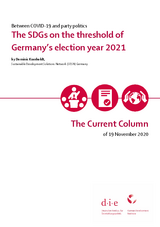The Current Column
Between COVID-19 and party politics
The SDGs on the threshold of Germany’s election year 2021
Kranholdt, DominicThe Current Column (2020)
German Development Institute / Deutsches Institut für Entwicklungspolitik (DIE), The Current Column of 19 November 2020
On the threshold of Germany’s election year 2021, parties and politics are in thrall to COVID-19 and the search for candidates. But are we losing sight in the process of the 2030 Agenda and its 17 Sustainable Development Goals (SDGs)? Or could the European Parliament election manifestos and the recent Bundestag debate on 16 September 2020 pave the way for a new beginning in sustainability policy? With the exception of the AfD, all parties expressed enthusiastic support for the 2030 Agenda and the German Sustainable Development Strategy (GSDS) during the debate. But how do we get from proposals and debates to specific political action?
Parties and sustainability: now more than nothing
While the 2030 Agenda and the SDGs did make an appearance in the sub-sections on environmental and development policy within the party manifestos for the 2017 German parliamentary election, they did not constitute an overarching narrative impacting all policy areas. The preambles and prefaces to the 2019 European Parliament election manifestos contained more references to the SDGs. For instance, the CDU, SPD and Green parties mentioned the 2030 Agenda and the SDGs at the beginning of their manifestos for the first time, and the FDP expressed explicit support for the 2030 Agenda. The Left party called for their binding implementation. However, none of the manifestos made systematic and explicit use of the SDGs as a benchmark in their individual sections or linked them to specific political measures and demands.
Bundestag debate: momentum for sustainability policy in the 2021 election year?
With the European Parliament manifestos having enhanced the status of the 2030 Agenda, the Bundestag debate of 16 September 2020 on sustainability could provide impetus for the 2021 manifestos. In their motion, the ruling parties CDU/CSU and SPD, called for all ministries to gear their activities to the need for sustainable development. They stated that, mid-way through every legislative period, it is necessary to take stock of implementation and achievement of the SDGs as part of the GSDS, and that, on this basis, the German Government should propose a list of measures to be submitted to the Bundestag. In their motion, the Green party advocated that the new GSDS draft serve as an overarching strategy, the principles and goals of which should be bindingly and consistently implemented in the numerous individual strategies and programmes. In its motion, the FDP called for goals to be implemented consistently at national level as part of the GSDS reform scheduled for 2020 and for Germany to set a good example as a leading industrialised nation. The Left party, which did not submit a motion, expressed during the debate its support for social security as a core element of sustainability and climate action. If this impetus from the Bundestag debate were to make its way into the German parliamentary election manifestos, then this could lead to a reorientation of sustainability policy from 2021 onwards. The proposal submitted by SDSN Germany to focus the GSDS on key transformations such as the circular economy or the agricultural and food transformation and overarching levers such as finance could also be helpful here. The German Government reflected upon these deliberations in a separate section of the preliminary version for the further development of the GSDS, published on 1 October 2020. This reform option received broad backing at the Federal Chancellery’s Sustainability Forum on 15 October 2020.
Now is the time to take control
With their European Parliament election manifestos, the motions of their parliamentary groups in the Bundestag and the existing reform options, the parties now have a solid foundation for taking control of the situation regarding the 2030 Agenda and the SDGs. They should mainstream the 2030 Agenda as the overarching narrative within their manifestos and set out how they intend to restructure German sustainability policy and implement it in the individual transformation areas. This approach will only translate into practical policy in the autumn coalition negotiations if the parties adopt clear positions on these matters in the coming months. After all, it is time to stop paying mere lip service to these issues and take decisive action to shape the Decade of Action announced by the international community at the SDG Summit in 2019. The COVID-19 pandemic does not make the path to the SDGs any easier, but, equally, these SDGs provide the compass for getting out of the crisis. Consequently, the COVID-19 election year 2021 should be characterised by the 2030 Agenda and its universal SDGs, regardless of the parties and candidates.

